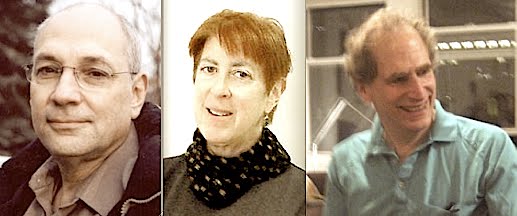Charles Olson, 'Maximus to Gloucester, Letter 27 (withheld)'
LISTEN TO THE SHOW
Bob Perelman, Rachel Blau DuPlessis and Charles Bernstein converged on Al’s office-studio to attempt what Al in his intro dubs a “daunting” task — to talk somehow about one of Charles Olson’s Maximus poems in such a way that would make the poem make sense and might serve as a good introduction to The Maximus Poems more generally. We don’t know if we succeeded but we certainly had fun trying. We chose a poem for which PennSound has two recordings, one made at the August 1963 Vancouver Poetry Festival and another made in Boston in 1962. As listeners will learn from episode 34 here, we also discovered that someone has made a YouTube video clip from a segment of the film about Olson, Polis Is This. In this segment, Olson reads the poem with what Rachel calls choreographic gestures, motions that continually point up the forward/backward, in-body/away planes or zones of geographic understanding. We happily add, below, a link to this remarkable but probably — most of us would agree — overdone performance.
 The title of that film comes from the memorable final line of our poem, “Maximus to Gloucester, Letter 27 (withheld),” the last parenthetic term here referring to the fact that it was excluded from the first major collection of Maximus Poems, The Maximus Poems of 1960. Excluded but then apparently much in demand and/or much admired by Olson himself.
The title of that film comes from the memorable final line of our poem, “Maximus to Gloucester, Letter 27 (withheld),” the last parenthetic term here referring to the fact that it was excluded from the first major collection of Maximus Poems, The Maximus Poems of 1960. Excluded but then apparently much in demand and/or much admired by Olson himself.
The poem, especially at the start (in which a family anecdote is told), seems personal and almost (in the term then popular) “confessional.” But, as the PoemTalkers put it, it soon begins to do the usual Maximus thing, engaging a vortexical historical method line by line, and gesturing hugely at the convergences of geography and culture across eras and the (at turns) triumphant and lamentable westwardness of everything.
July 26, 2010
On the rounendless talk of cut-ups
More...